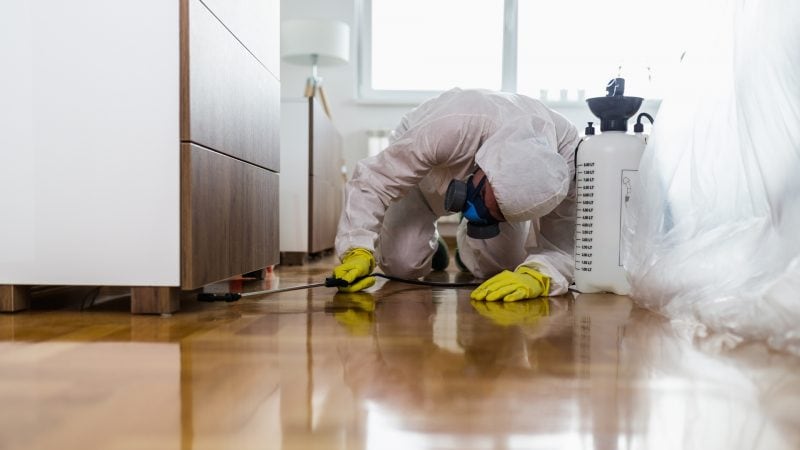Finding ants marching through your closet and all over your clothes will definitely force you to act. Ants can transfer diseases, but only if they come in contact with your food. Having them on your clothes is not a reason to worry, at least not from a health point of view.
So, how to get rid of ants in your closet? Ant baits are the most efficient solution as they lure ants out of your closet and carry the bait (poison) back to their nest to share it with the whole colony. Over a certain time period, the whole ant nest will slowly die, and your closet and clothes will be ant-free.
You can also use some products around your closet (ant deterrents) to protect it from ants in the first place. Most importantly, you should not use any spray or insecticide directly on your clothes or inside the closet. Wearing clothes that were treated with insecticides is a terrible idea and can cause serious health problems.
Why Have Ants Infested Your Closet?

Ants don’t feed on fabrics, so in most cases, ants are just passing through your closet searching for food or shelter. Sometimes behind or under your closet, you could have a crack in the wall or floor, and ants are just using the closet as a faster way to move around your home.
When fighting ants in and around the closet, check behind and under it, just in case. You can also spread the diatomaceous earth around places in your closet where you think the ants are coming out, and it should stop them from using those entrance spots. Additionally, you can also seal those spots with spackle or plaster.
Why Are Ants Swarming a Particular Piece of Clothing in the Closet?

If you see ants swarming around clothing, it can be because something in that clothing part attracts them. Maybe you left something in it that ants love to eat, or it had some sugar or juice stain.
In cases like this, it is best to put the infested clothing in a bag and seal it tight so no ants can leave it. Then vacuum the clothes outside, where there is no chance of ants getting back into the home. After vacuuming, put the clothes into the washing machine, which will destroy any ants left in the clothing.
How to Get Rid of Ants in Your Closet?
Once your closet is infested with ants, that is a sign of a bigger problem, but for now, let’s just focus on removing ants from your closet. The best solution for this problem is ant baits. You can make an ant bait by yourself or buy one in a store or online. Some of the bestsellers on Amazon are:
Sale 1
TERRO Ant Killer Bait Stations T300B - Liquid Bait to Eliminate Ants - 12 Count Stations for Effective Indoor Ant Control
- ATTRACTS & KILLS: Effectively targets and eliminates common...
- KILLS THE ANTS YOU DON'T SEE: Terro ant bait is designed to share...
- FAST-ACTING: Noticeable ant activity reduction within days as...
- READY TO USE: Simply place ant baits indoors with no setup...
- VERSATILE HOME PLACEMENT: Ideal for use as terro ant traps along...
2
Raid Ant Killer Baits, Child Resistant Bug Killer for Indoor Home Use, 0.24 Oz, 8 Count
- One 8 count package of Raid Ant Killer Baits protects against...
- Raid Ant Killer works for up to 3 months to help control ants in...
- This pest killer comes in convenient Raid Ant Traps where ants...
- Raid Ant Killer is ideal for use throughout your home, including...
- Try other Raid bug spray and insect killer products for all of...
Sale 3
TERRO Liquid Ant Baits - T1813 - Outdoor Ready-to-Use Terro Ant Traps - Pack of 12 Liquid Traps
- EFFECTIVE ANT ELIMINATION: Terro outdoor liquid ant baits attract...
- COLONY CONTROL: Worker ants carry Terro ant bait back to the...
- FAST-ACTING RESULTS: With the use of Terro ant killer, experience...
- SIMPLE SETUP: Terro outdoor ant bait is easy to use with insert...
- OUTDOOR PROTECTION: Place Terro ant bait stations outdoors to...
5
Terro T334B Liquid Ant Baits Indoor - Terro Ant Trap and Bait Stations - Liquid Traps
- ATTRACTS & KILLS ANTS: TERRO ant killer attracts and kills common...
- FAST-ACTING RESULTS: Notice a significant decrease in ant...
- SAME BAIT, IMPROVED DESIGN: The new and improved liquid ant traps...
- READY TO USE: The pre-filled sugar ant traps indoor are easy to...
- DISCREET PLACEMENT: Lay flat or use the included foam adhesive...
- ATTRACTS & KILLS: Effectively targets and eliminates common...
- KILLS THE ANTS YOU DON'T SEE: Terro ant bait is designed to share...
- FAST-ACTING: Noticeable ant activity reduction within days as...
- READY TO USE: Simply place ant baits indoors with no setup...
- VERSATILE HOME PLACEMENT: Ideal for use as terro ant traps along...
- One 8 count package of Raid Ant Killer Baits protects against...
- Raid Ant Killer works for up to 3 months to help control ants in...
- This pest killer comes in convenient Raid Ant Traps where ants...
- Raid Ant Killer is ideal for use throughout your home, including...
- Try other Raid bug spray and insect killer products for all of...
- EFFECTIVE ANT ELIMINATION: Terro outdoor liquid ant baits attract...
- COLONY CONTROL: Worker ants carry Terro ant bait back to the...
- FAST-ACTING RESULTS: With the use of Terro ant killer, experience...
- SIMPLE SETUP: Terro outdoor ant bait is easy to use with insert...
- OUTDOOR PROTECTION: Place Terro ant bait stations outdoors to...
- ATTRACTS & KILLS ANTS: TERRO ant killer attracts and kills common...
- FAST-ACTING RESULTS: Notice a significant decrease in ant...
- SAME BAIT, IMPROVED DESIGN: The new and improved liquid ant traps...
- READY TO USE: The pre-filled sugar ant traps indoor are easy to...
- DISCREET PLACEMENT: Lay flat or use the included foam adhesive...
If you want to make an ant bait by yourself, we recommend using boric acid as the main part of the bait (the actual poison for ants). Add sugar, honey, or grease to lure the ants into your homemade ant trap.
How Does the Ant Bait Work?
Ants will take the bait and take it back to the nest. Once in the nest, they will eat it and ingest it. Boric acid is deadly for ants’ metabolic system, which is why it works so well. Once in the nest, this bait will do its part, and all the ants that come in touch with it will perish.
Don’t forget to clean ant pheromone trails with this and ants won’t be able to find a way back into your closet. For that purpose, you can use regular soap because it will remove the scent, and its smell deters ants. Another ally in your fight against ants in your closet is a vacuum cleaner. If you see many ants, just crank up the vacuum, and start vacuuming them. After vacuuming, you will still need to add some ant baits.
Be sure to keep away the children and pets from the spots where you placed boric acid baits. Boric acid is a low-toxicity pesticide, but it can still cause harm if used improperly. Also, leaving your clothes inside your closet until you exterminate these pests is better because you can spread ants around other rooms in your home if you try to clean the clothes.
How to Get Rid of Ants in The Closet Naturally?

1. Use Boric Acid
- Industrial grade strength
- 99.9+ percent pure
- Anhydrous (without water)
- High quality boric acid
- Powder form
Boric acid can help you get rid of ants from your closet by gently suffocating the insects and killing them. Combine boric acid with honey or sugary syrup and apply it to locations where ants are a problem so that it is visible to you.
2. Cinnamon
Ants can be repelled by scattering cinnamon powder or laying cinnamon sticks close to entry locations. Their smell traces are messed up by the powerful aroma.
3. Vinegar
Acetic acid, which is present in vinegar, is responsible for its characteristic flavor and aroma. Ants can be repelled by spraying a solution made of equal parts vinegar and water around their paths, entry sites, or problem areas. Their scent trails are obscured by the potent odor.
4. Essential Oils
- PET-FRIENDLY & FAMILY-SAFE FORMULA – Mighty Mint is a top pick...
- POWERFUL PLANT-BASED PEST CONTROL – Formulated with...
- EFFECTIVE INDOOR & OUTDOOR USE – Designed for versatile...
- FRESH MINTY SCENT WITH LONG-LASTING EFFECT – Infused with pure...
- READY-TO-USE 16 OZ SPRAY FOR TARGETED APPLICATION – Perfect for...
- Botanical Name: Mentha Piperita. Plant Part used: Herb....
- Soothing Skin Elixir: Add a few drops of Peppermint (Mentha...
- Aromatherapy Oasis: Fill your diffuser with water and add 5-7...
- Revitalizing Body Massage: Elevate your massage experience by...
- Chemical-Free Cleaning Solution: Create your own all-purpose...
- 100% PURE & NATURAL PEPPERMINT OIL - Handcraft Blends oils are...
- PREMIUM GRADE & QUALITY – All Handcraft Blends Essential Oils...
- HIGH QUALITY GLASS BOTTLE AND DROPPER – Our essential oil comes...
- VERSATILE FOR DIY PROJECTS – Perfect for aromatherapy, massage,...
- BOTTLED IN THE USA – Our oils are sourced from the best regions...
A natural ant-repellent can be made by diluting some essential oils with water, such as peppermint or eucalyptus oil. Ants don’t enjoy the powerful aromas of these oils. Spray the solution in ant-infested regions or along ant trails after combining a few drops of the oil with water.
5. Keep Vacuuming Your Closet
Most ants will be sucked and killed by using a vacuum cleaner, while others will run helter-skelter due to the pressure and loud noise it produces. You must vacuum the closet thereafter and then clean it with the proper cleaning supplies to get rid of the ant pheromones.
Ants in Closet: How to Prevent This From Happening?
It all sums up to general hygiene around your home when it comes to protecting your clothes and closet from ants. If you have ants in your closet, something in your home attracts ants, and your closet is just one of the places ants choose to roam.
They search for shelter, water, and food (click to see what ants eat). Usually, ants don’t invade closets for some specific reason, and that place is, in most cases, just a part of their route to another part of your home. Ants don’t feed on fabrics, so clothes themselves are not a reason their reason for invading your closet.
So if you want to prevent ants from entering your closet, you must find out how did the ants come into your house in the first place and why. Ants usually search for a place they can make a colony and a nest, and if there is a source of food, that is one more reason to move in.
First, you should check if you live in the house for cracks in the walls and foundation. Even the smallest opening is enough for ants to find a way inside your home. If there are cracks and ants going inside, you can also try following their trail. That way, you can get to the source of the ant infestation.
When fighting ants in your walls and foundation, it is recommended to use a pesticide. You can try doing it yourself or calling a professional. Also, fix the cracks around your house, so no new ants can come in.
Ants just love roaming through garbage because there is always something to eat. Don’t leave your garbage sticking around for too long because a lot of garbage near your home signals ants to start marching around.
Keeping your home clean from the inside is also a good precaution because leftover food can also be a reason for ants to move in, first into your home and then into your closet. Throw out any leftover food regularly.
Ants in Closet: When Should You Call the Professionals?

If you notice a huge number of ants and can’t find a place where they are coming from, then you should contact a professional service (exterminator).
In cases when you don’t know how to battle the ants, like when they are coming out of the cracks in the walls and foundation behind the closet, you should contact them as well because there can be a nest, and that problem needs to be resolved as fast as possible.
Of course, if you are not comfortable or don’t want to handle that problem yourself, you can call professionals. Yes, there are numerous DIY solutions for these problems, but in some situations, they can be just too hard to implement without experience.
Related: How to Get Rid of Ants | Safe and Effective Methods
List of Sources
Lanan M. (2014). Spatiotemporal resource distribution and foraging strategies of ants (Hymenoptera: Formicidae). Myrmecological news, 20, 53–70.
Managing Structure Invading Ants, University of Tennessee Institute of Agriculture
Nyamukondiwa, C., & Addison, P. (2014). Food preference and foraging activity of ants: recommendations for field applications of low-toxicity baits. Journal of insect science (Online)
Alharbi, J. S., Alawadhi, Q., & Leather, S. R. (2019), Monomorium ant is a carrier for pathogenic and potentially pathogenic bacteria
Lenzen C., Radeva T., The Power of Pheromones in Ant Foraging
- How to Get Rid of Copperheads | Practical Guide - August 27, 2023
- How to Get Rid of Corn Snakes | What Makes Them Aggressive? - August 27, 2023
- How to Get Rid of Alligators | Safety Measures and Removal Methods - July 16, 2023










